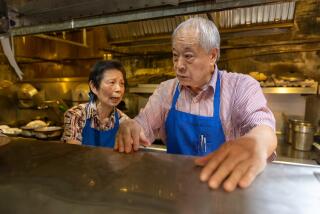A Cultural Revolution in Beijing, via Golden Arches : McDonald’s: Billions served? The fast-food giant hopes to serve a billion more as its eatery opens on one of the city’s busiest corners.
- Share via
BEIJING — After years of preparation, hundreds of smiling employees officially opened the doors today to the Chinese capital’s newest landmark: the golden arches of the world’s largest McDonald’s.
Located a stone’s throw from Beijing’s Tian An Men Square and on one of the city’s busiest corners, the American icon is expected to attract huge crowds of curious, hungry customers.
One curious Chinese passer-by had his face pressed to the spotless front window before he grasped just what McDonald’s sells. “I thought it was a clothes store,” he said with a giggle.
The two-story Beijing franchise is the third McDonald’s in China. In 1990, the company’s Hong Kong subsidiary opened an outlet in the capitalist enclave of Shenzhen, the south China economic zone that borders Hong Kong. Three days ago, a second Shenzhen outlet opened and set a company opening-day sales record.
Pizza Hut and Kentucky Fried Chicken have already opened profitable franchises in Beijing. The new McDonald’s “is another example of the recent American business boom in China,” said John Frisbie, Beijing representative of the U.S.-China Business Council.
America’s best-known fast-food chain, known as Maidanglao in Chinese, has invested seven years preparing for the move into China’s capital, from training staff to making the perfect French fry.
Construction began last year on one of China’s choicest pieces of real estate, a location fronting the Avenue of Eternal Peace and across from the venerable Beijing Hotel. About 300,000 people walk by the corner daily, McDonald’s officials say.
McDonald’s plans to invest $50 million in the next three years to open 20 more outlets.
The 28,000-square-foot Beijing branch will get 95% of its food and packaging in China, including all its beef, chicken and potatoes, said Ti Chang, managing director of McDonald’s China Development Co.
No matter where the food comes from, the prospect of burgers won’t necessarily please all here. Most Chinese “go to a hamburger restaurant just for a good time,” one young woman said. “When they want a real meal they eat other (Chinese) dishes.”
Price also will be a problem for many. A full meal with a Big Mac costs the equivalent of $3, substantially more than in Hong Kong. Because Beijing residents earn an average of $35 monthly, buying a McDonald’s meal will take a formidable bite of a worker’s pay.
As for the workers at the new eatery, the competition for jobs has been fierce; there were more than 20,000 applications for 850 positions. One incentive was the average monthly pay for a starting employee--350 yuan ($60).
Financially secure, employees also will be politically and technically well-trained for the rush of customers. Manager Timothy Lai has ensured that McDonald’s will get its money’s worth from its workers by instilling in them the “customer is always right” principle and a work ethic that is still rare in China.
More to Read
Inside the business of entertainment
The Wide Shot brings you news, analysis and insights on everything from streaming wars to production — and what it all means for the future.
You may occasionally receive promotional content from the Los Angeles Times.








